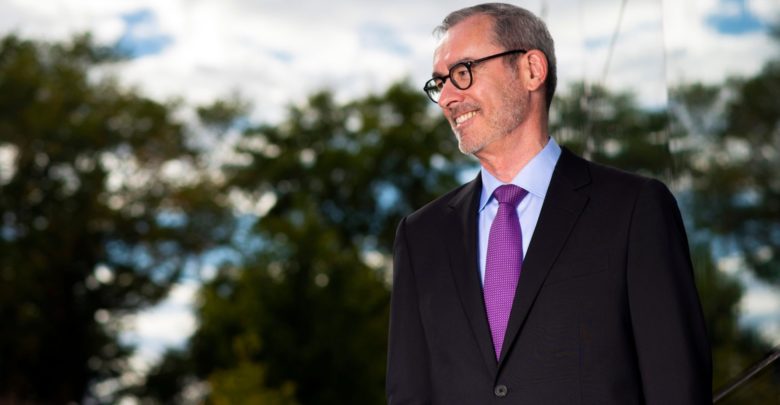U of A President and Vice-chancellor Bill Flanagan discusses reappointment
The Gateway spoke to Flanagan about his reappointment, his plans for the next term, and how he plans to address current concerns on campus.
 John Ulan
John UlanOn June 25, the University of Alberta announced that current President and Vice-chancellor Bill Flanagan was reappointed for a second term. Flanagan has served as president and vice-chancellor since July 2020. His current term is set to end on July 1, 2025.
According to Board of Governors (BoG) Chair Kate Chisholm, on June 14 BoG voted to endorse the recommendations of the Presidential Review Committee and the Board Human Resources and Compensation Committee to reappoint Flanagan.
The Gateway spoke to Flanagan about his reappointment and his future plans for the university.
Flanagan discusses enrolment goals
The Gateway asked Flanagan why he chose to put his name forward for reappointment. He cited SHAPE, the university’s new 10-year strategic plan, and its “very ambitious targets.” A key goal of SHAPE is to increase enrolment to 60,000 students from 44,000 students, over the next 10 years.
“[Getting] an opportunity to have a part in shaping that plan and bringing it to fruition is really exciting,” Flanagan said. “We’ve got a very young, rapidly growing province. So we do think it’s possible.”
Flanagan added that such enrolment growth would allow for more investment in faculty and research.
“The opportunities for the U of A will only become more and more exciting. So I’m very excited to have the opportunity to join all of our colleagues and students in building that really bright future for the university.”
“There’s still more that we need to do to support students with financial need,” Flanagan says
In March, BoG approved tuition increases for a fifth consecutive year. As well, the U of A’s provincial grant has faced over $222 million in cuts from the Government of Alberta over the past five years. The Gateway asked Flanagan how he plans to address the financial concerns of both students and the university.
“There’s been significant tuition increases over the last four years along with a dramatic decline in provincial funding,” Flanagan said. At the top of his list is “continuing to talk to the province about the importance to invest in post secondary.” Additionally, Flanagan wants to continue conversations about the university’s economic impact on Alberta.
“This is a message I’m delivering consistently to provincial policy-makers,” he said.
Flanagan added that the university needs to “really be thoughtful around supporting students with financial need.”
“There’s still more that we need to do to support students with financial need. We want to make sure that the U of A is accessible to all qualified students who apply.”
Third-party review on encampment removal is “a really important step forward”
On May 11, a Palestine solidarity encampment on the Main Quad was forcefully taken down by the Edmonton Police Service (EPS) at the university’s request. Following the encampment removal, students, faculty, and community members have called for Flanagan’s resignation. As well, on July 2 the U of A announced it was proceeding with a third-party review on the encampment removal.
The Gateway asked Flanagan how he plans to address concerns with his leadership. He mentioned the third-party review and said it’s “a really important step forward” from which he’s “sure there will be lessons learned.”
“The conflict in Gaza and Israel is really a heartbreaking conflict. And I know that many of our community members are deeply affected by this conflict. And there are many strong views about this conflict.”
He added that the university needs to “be a site where difficult conversations can take place,” and cited the U of A’s commitment to freedom of expression.
In a statement on May 12, Flanagan said the encampment was removed because of “serious and potentially life-threatening risks associated” with it. Encampment organizers responded to the statement, addressing the allegations Flanagan made.
“I’m very committed to the university being that place for those conversations. And that includes protest,” Flanagan said. “It has to be within the restraints of the university policy. And again, we want to make sure that the university grounds are available to everyone and are welcoming for everyone.”
“The student experience is really at the top of the list,” Flanagan says
Regarding current and future projects, Flanagan said the U of A has the “potential to have a global impact in the next three years” in agriculture, food, and food security; Indigenous knowledge and research; and social transformations. Additionally, he said the U of A’s top three areas of research are energy solutions, artificial intelligence (AI), and health.
“I feel very privileged to be a part of university that’s making such an important research contribution in Alberta, Canada, and around the world.”
Flanagan said there’s a “tremendous potential” for investing in technology enhanced learning. He added that hybrid learning is popular amongst U of A students, and that AI has a “remarkable potential to be a very powerful learning tool.”
These are a few areas that Flanagan will look to work on over the coming years. Overall, “the student experience is really at the top of the list,” he said.
The Gateway asked Flanagan how he hopes to impact the U of A during the next five years of his term.
“My dreams for the U of A over the next few years would be to see the growth realize. To see the investment in teaching and research. To have an impact that’s even broader.”
He mentioned targets to rank among the top 50 universities in the world and top three in Canada.
“I think it’s realistic. With the kind of growth opportunities we have and the growth opportunities that Alberta has, I do think that there’s a path to getting there. So the extent to which I along with my colleagues, faculties, and students can pull together to move the U of A forward, I’m very excited about.”




